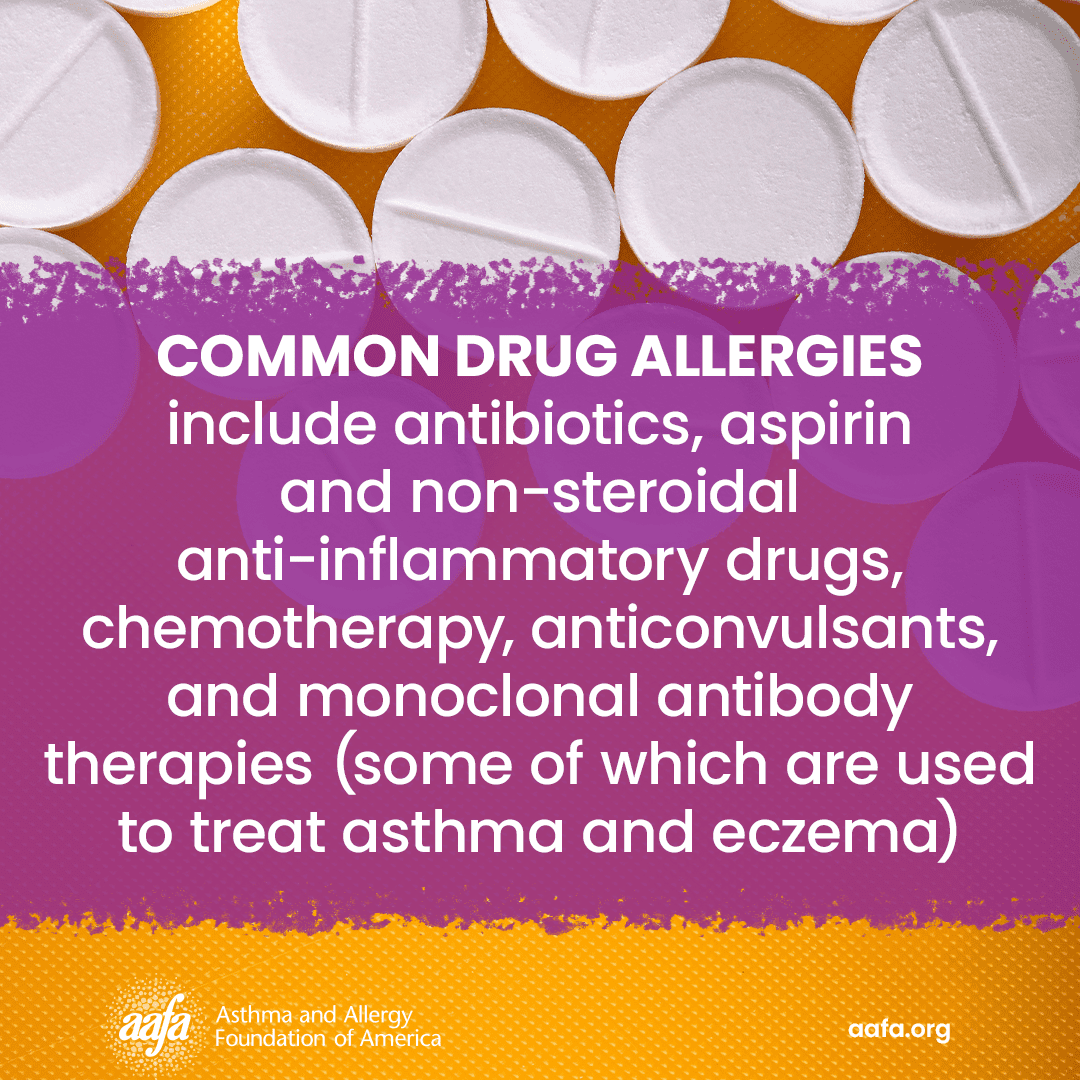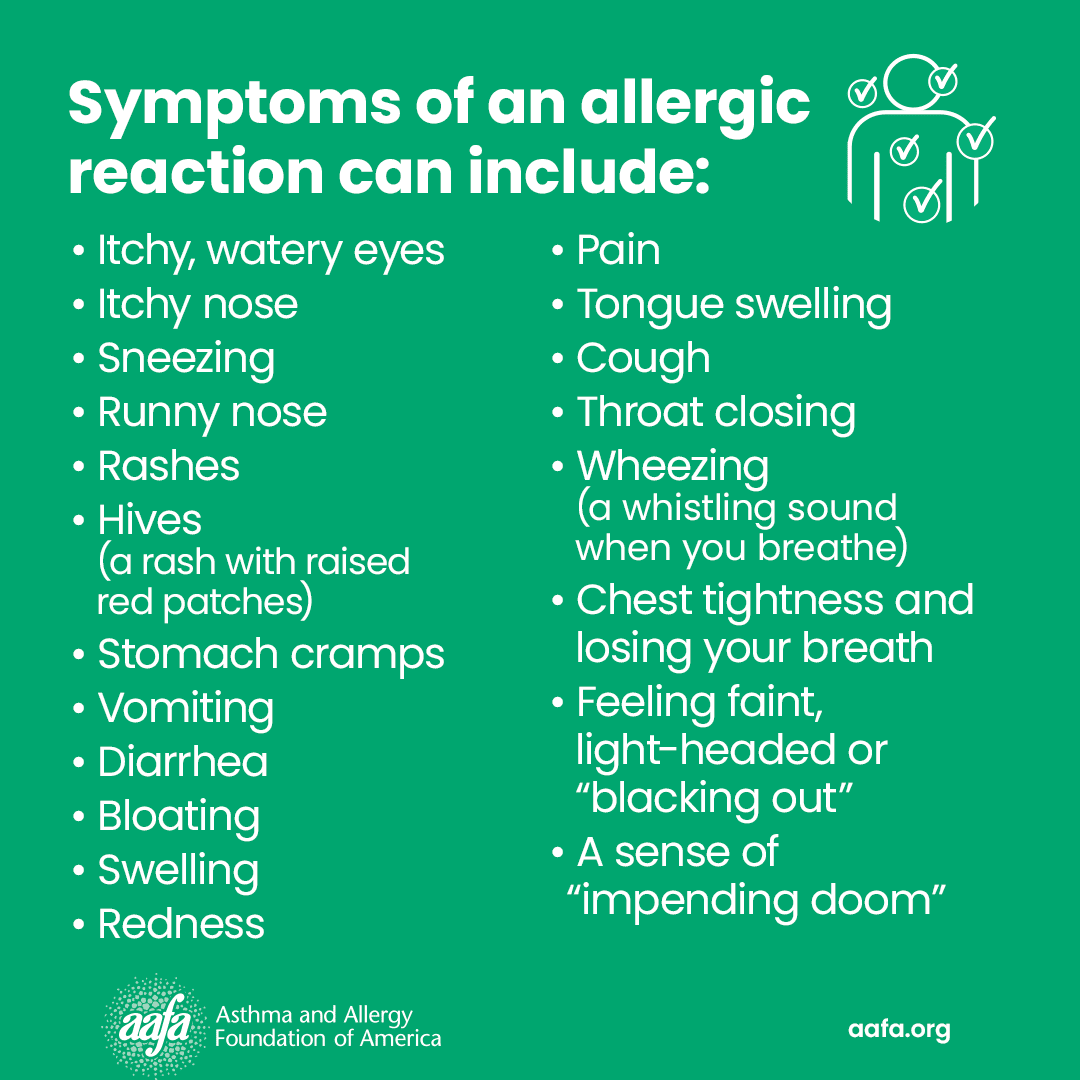Allergies
Drug Allergy and Other Adverse Reactions to Drugs
“Drug allergy” is a common term used for both a true allergic reaction and an adverse reaction to a medicine. Severe drug reactions account for 3% to 6% of all hospital admissions worldwide. Drug allergy accounts for less than 10% of these severe drug reactions.1
What Is a Drug Allergy?
There are two types of reactions to medicines:
- Adverse (non-allergic) reaction – most common reaction to medicines
- Drug allergy – a true allergy that involves your immune system
Adverse reactions to medicines are common. But true drug allergies are rare. Only about 5 to 10% of reactions to drugs are true allergic reactions.1 Many people use the terms “medicine allergy or “drug allergy” to refer to both types of reactions.
Drugs that most commonly trigger allergic reactions include:2
- Antibiotics, such as penicillin
- Aspirin and non-steroidal anti-inflammatory medications (NSAIDS), such as ibuprofen and aspirin
- Anticonvulsants
- Monoclonal antibody therapy (this includes biologics which are used to treat asthma, food allergies, and eczema)
- Chemotherapy

Only 5-10% of adverse reactions to medicines are allergic reactions. If you think you may be allergic to a medicine, tell your doctor. They may recommend seeing an allergist.
What Are the Symptoms of a Drug Allergy?
A drug allergy and an adverse reaction may have similar symptoms. A drug allergy involves your immune system.
Common symptoms of an allergic reaction to a drug can include:
- Rash or hives
- Itching
- Breathing problems
- Swelling, especially the face and tongue
The most common type of immune drug reactions are skin rashes (other than hives). These are normally what we call “drug rashes.” In these skin reactions, your skin becomes red, irritated, and may have bumps. Other types of skin reactions can occur due to drugs. For example, you may get bruises and ulcers.
A true drug allergy can cause a severe allergic reaction called anaphylaxis [anna-fih-LACK-sis].
Symptoms of anaphylaxis usually involve more than one part of the body such as the skin, mouth, eyes, lungs, heart, gut, and brain. Some symptoms include:
- Skin rashes, itching, and hives
- Swelling of the lips, tongue, or throat
- Shortness of breath, trouble breathing, wheezing (whistling sound during breathing)
- Stomach pain, vomiting, or diarrhea
- Feeling like something awful is about to happen
Anaphylaxis can occur minutes after ingesting a drug or being exposed to an allergen and can get worse quickly. You can’t predict how your body will react to a certain allergen from one time to the next. Both the types of symptoms and how serious they are can change. So, it’s important to be prepared for all allergic reactions, especially anaphylaxis.
The first-line treatment for anaphylaxis is epinephrine. You must treat anaphylaxis right away for the best chance for improvement and to prevent serious, potentially life-threatening complications.
If you have an allergic reaction to a medicine, stop taking it and contact your doctor right away.
There are many other ways the immune system may react to a drug which are not considered an allergy. For example, antibodies to certain drugs can destroy red blood cells. This can cause anemia.
What Are the Symptoms of an Adverse Reaction to a Drug?
An adverse reaction – or non-allergic reaction – to a medicine does not involve your immune system. But some of the symptoms can be similar.
An example of an adverse reaction to a medicine is getting an upset stomach or diarrhea from an antibiotic or vomiting and hair loss from a chemotherapy drug.
Types of Adverse Reactions to Drugs
There are different types of adverse reactions to drugs:
- Overdosing: An overdose happens when you take more than the recommended or prescribed dose. Reactions due to overdosing can be harmful and you may not realize it’s happening. For example, if you take too much acetaminophen (TYLENOL®), it can affect your liver. Often, you don’t know you are reacting to an overdose until the condition becomes severe and can cause damage that can’t be reversed.
- Known side effects: Many drugs have known side effects. For example, some antihistamines (such as BENADRYL®) can make you drowsy.
- Indirect effects: A good example of an indirect effect is when antibiotics cause diarrhea. This is because it affects the normal bacteria in your bowel.
- Drug interactions: Drug interactions happen when you take two medicines that cause side effects when you take them together. This can occur when the two drugs both pass through the liver the same way. For example, the liver metabolizes erythromycin (an antibiotic) and theophylline (an asthma medicine) through the same pathway. When you take them together, the metabolism of theophylline slows. The theophylline can reach toxic levels.
- Worsening of a known condition: This can happen when you take a drug for one condition, but it makes another condition worse. For example, if you take a beta-blocker for a heart condition, it may make your asthma worse.
- Idiosyncratic reactions: Some drugs tend to cause unusual reactions for reasons experts do not understand. For example, quinolone antibiotics (such as levofloxacin) may cause a tendon rupture. But experts don’t know why some people are more likely to have this side effect or how the rupture happens.
If you have any reaction to a medicine that concerns you, talk with your doctor.
How Does a Doctor Diagnose a Drug Allergy?
If you think you may be allergic to a medicine, see a board-certified allergist, if possible.
To diagnose a drug allergy, your doctor will do a physical exam and will ask you about your medical history. Your doctor may do allergy testing to confirm a true allergy. But tests are only available for a small number of drugs that cause these reactions. Your doctor may then make a diagnosis based on your medical history and symptoms. Or they may have you stop the drug to see if your symptoms go away.
One test available is the test for penicillin allergy. Penicillin is one of the most common causes of drug allergy. But many people who have been diagnosed with a penicillin allergy may not be truly allergic. They may also lose their allergy over time.3
Sometimes the allergist will do a drug challenge. A drug challenge is a test where the allergist gives you a small amount of a drug in gradual doses while observing you to watch for a reaction.
Medical Review: May 2024 by Neeta Ogden, MD
Closed
References
- Torres Jaen, M. J. (2021). Drug Allergies. World Allergy Organization. https://www.worldallergy.org/component/content/article/drug-allergies-thong-b-vervloet-d-torres-jaen-mj-updated-2021?catid=16&Itemid=101
- Drug Allergy Symptoms, Diagnosis, Treatment & Management | AAAAI. (2022). American Academy of Allergy, Asthma & Immunology. https://www.aaaai.org/Conditions-Treatments/allergies/drug-allergy
- Penicillin Allergy FAQ. (2023. American Academy of Allergy, Asthma & Immunology. https://www.aaaai.org/tools-for-the-public/conditions-library/allergies/penicillin-allergy-faq













